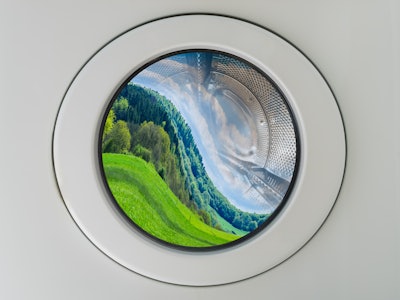So says Underwriters Laboratories (UL), acquirer of TerraChoice, which published the report, The Seven Sins of Greenwashing. With more than a decade having passed since its coinage, greenwashing has a history of application, relevant to packaging suppliers and packaging users.
In theory, allegations of greenwashing protect the consumer. It’s tempting, therefore, to assume that the allegations have validity. Choosing the path of least resistance, the trade press, industry conferences, and trade-associations have (mostly) focused on educating companies on how to avoid greenwashing.
The aforementioned definition, by its use of the term misleading, implies intent on the part of the alleged greenwasher. Even allowing for the possibility that a given claim can be misleading, there’s a distinction between misinformation and disinformation: the former is committed without intent; the latter is committed with intent. To ignore the distinction makes educating companies on how to avoid greenwashing an easy task: simply instruct them to be honest and to not intentionally mislead.
Only it’s not that easy and simple. That’s because the vast majority of companies operate cognizant of the constraints imposed by consumer acceptance, competitors’ responses, and agency regulations. Granted, there’s the constant “pushing the envelope” that seeks a competitive advantage; nonetheless, no straight-thinking company does so at the sacrifice of its reputation and long-term viability.
Condemning a claim like greenwashing involves not only a definition but also how the definition is applied. An allegation should have elements that, if met, justify the allegation. Those elements should be specific and not applied indiscriminately; otherwise, every company can be said to be a greenwasher, rendering moot discussions about how to avoid the practice.
To illustrate, following is a listing of The Seven Sins of Greenwashing, what they allege, and comments regarding their practicality.
Sin of the hidden tradeoff: the environmental benefit of a practice is claimed without mention of environmental-impacting tradeoffs. Environmental stewardship, however, is all about tradeoffs, as embodied in the concept of Life-Cycle Assessment, which takes into account the net effect of the myriad variables involved in a product’s journey from “cradle-to-grave.” Tradeoffs are not necessarily hidden just because they are not individually cited, for to do so would require every product to be accompanied by an extensive report, constituting information overload on the consumer.
Sin of no proof: a claim is made without being substantiated by an independent informational source or third-party certification. That’s not to argue that such substantiation always is objective. To decry a claim as greenwashing for lack of proof, instead of establishing the falseness of the claim, is (ironically) a version of the sin of no proof. Anyway, companies don’t have carte blanche to make whatever claims they choose, as evidenced by the Federal Trade Commission’s guidelines and enforcement powers.
Sin of vagueness: a claim is so broad that it lends itself to various interpretations, the oft-cited example being “all natural.” But equally broad is the term, “green,” as is its derivative, “greenwashing.” There’s inescapable subjectivity to vagueness but it shouldn’t be alleged so strictly that it only exempts product category names.
Sin of worshiping false labels: the package, via imagery, gives the arguably false impression that the product is green (there’s that term, again). The allegation is not without substance, given that companies have wide leeway in leveraging packaging in that manner. Consumers have recourse, however, by way of federally-mandated listing of ingredients.
Sin of irrelevance: a claim that, while true, provides no help to consumers seeking to evaluate a product’s environmental bona fides. An example is, “contains no (fill in the blank),” even though the referenced ingredient is banned and not present throughout the product category. Question: at what time should irrelevance set in? That is to say, when does the consumer no longer need the information? The EPA banned the use of CFCs as aerosol propellants in 1994, but FDA banned the use of BPAs in baby bottles in 2012.
Sin of lesser of two evils: a claim that a member of an environmentally suspect product category is an improvement over its predecessor and/or other members of that category. The truth of the claim need not be what’s being challenged, in which case, the allegation is against the category’s right to exist. Potato chips, for example, don’t quality as healthful, regardless of the oil that’s used. Nonetheless, some oils are better than others.
Sin of fibbing: a claim is an outright lie, intentionally. There’s no defending the practice, and any guilty company deserves whatever punitive measures that come its way. Period.
It is not herein being argued that greenwashing, as a concept, has no merit. But when close to 100% of the thousands of claims evaluated in the aforementioned report (both the original and its subsequent versions) were judged examples of greenwashing, it invites inquiry. After all, Kermit the frog warned us that it’s not easy being green, but he didn’t say it’s impossible.


























